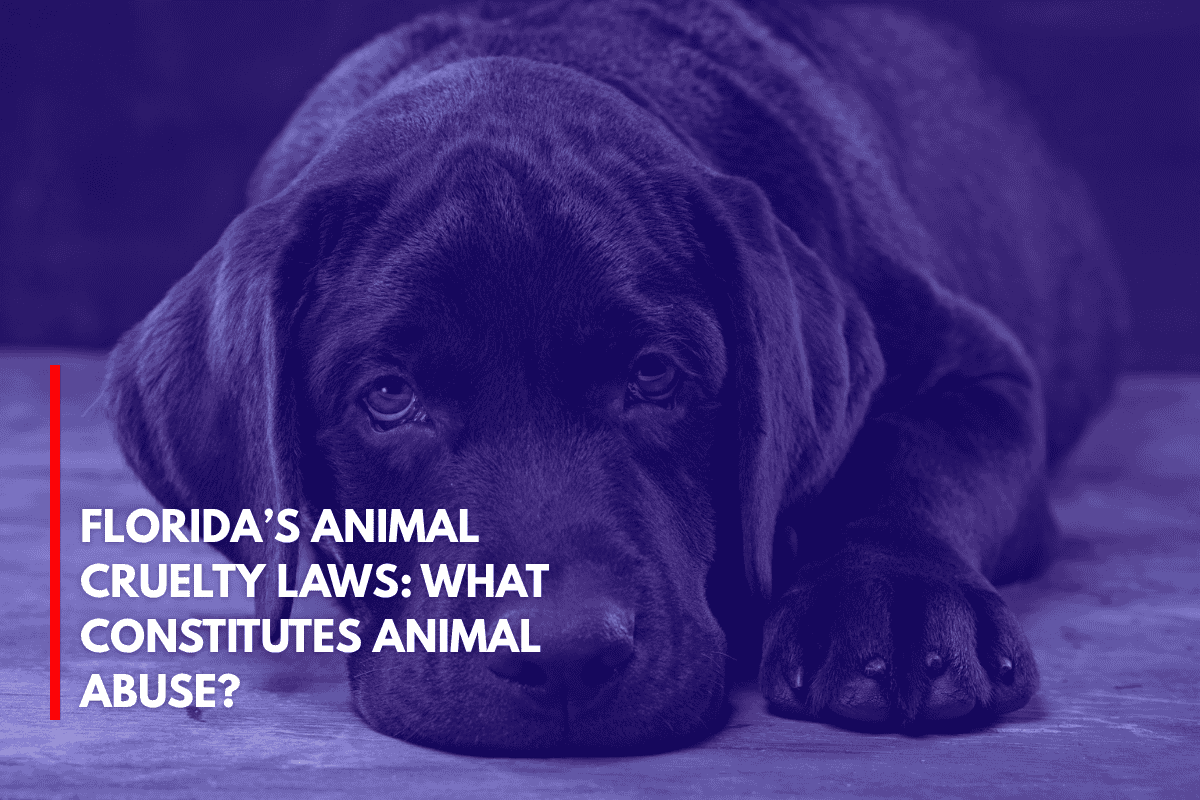Florida’s animal cruelty laws are comprehensive and designed to protect animals from abuse, neglect, and intentional harm. The state defines animal cruelty and outlines specific legal consequences for violations.
What Constitutes Animal Abuse in Florida?
Legal Definition of Animal Cruelty
Under Florida Statute 828.12, animal cruelty occurs when a person unnecessarily overloads, overdrives, torments, deprives an animal of necessary sustenance or shelter, or unnecessarily mutilates or kills any animal.
This also includes carrying an animal in or upon any vehicle in a cruel or inhumane manner. The law defines “animal” as “every living dumb creature,” which covers a wide range of domestic and wild animals.
Examples of Animal Abuse
Animal abuse can take many forms, both through direct actions and failures to act. Common examples include:
Physical violence: Beating, burning, drowning, or otherwise inflicting pain on an animal.
Neglect: Failing to provide adequate food, water, shelter, or necessary medical care.
Intentional harm: Torturing, tormenting, or mutilating an animal.
Abandonment: Leaving an animal to suffer or die, especially if it is sick, injured, or unable to care for itself.
Aggravated Animal Cruelty
Florida law also recognizes aggravated animal cruelty as a more serious offense. This occurs when a person intentionally commits an act that results in the cruel death, or excessive or repeated infliction of unnecessary pain or suffering, or causes the same to be done. This includes knowing and intentional torture or torment that injures, mutilates, or kills an animal.
Who Can Be Held Responsible?
Not only owners but also anyone with custody or control of an animal can be held responsible for its well-being. This includes temporary caregivers, adults living in a home where an animal is suffering, and others who have responsibility for the animal’s care.
Failing to act—such as not providing necessary medical attention to an injured animal—can also be considered animal cruelty.
Legal Penalties
Animal Cruelty:
First-degree misdemeanor, punishable by up to one year in jail, a fine of up to $5,000, or both.
Aggravated Animal Cruelty:
Third-degree felony, punishable by up to five years in prison, a fine of up to $10,000, or both. If the offense involves knowing and intentional torture or torment, the convicted person must pay a minimum mandatory fine of $2,500 and undergo psychological counseling or complete an anger management treatment program.
For a second or subsequent conviction, the minimum mandatory fine is $5,000, and the offender must serve at least six months in jail, with no eligibility for early release.
Multiple Offenses
A person who commits animal cruelty or aggravated animal cruelty against more than one animal may be charged with a separate offense for each animal harmed.
Florida law defines animal abuse broadly to include both acts of violence and failures to provide necessary care. The legal consequences are severe, especially for aggravated cruelty, and apply to anyone with responsibility for an animal’s welfare.
The state’s commitment to animal protection is reflected in both the scope of the law and the penalties for violations.
Sources:
– https://www.sao5.org/community/animal-cruelty-task-force/
– https://www.animallaw.info/statute/fl-cruelty-humane-slaughter-consolidated-cruelty-statuteshumane-slaughter-laws
– https://aldf.org/article/florida-
– https://www.osceolacountypets.com/stopabuse/













Leave a Reply